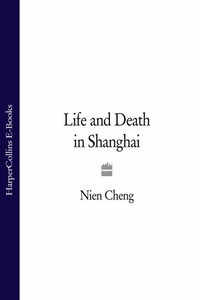Life and Death in Shanghai
Nien Cheng
Fourth Estate
An imprint of HarperCollinsPublishers Ltd. 1 London Bridge Street London SE1 9GF
www.harpercollins.co.uk
Published by Flamingo 1995 an imprint of HarperCollinsPublishers
First published in Great Britain by Grafton 1986
Copyright © Nien Cheng 1986
A catalogue record for this book is available from the British Library
Nien Cheng asserts the moral right to be identified as the author of this work
All rights reserved under International and Pan-American Copyright Conventions. By payment of the required fees, you have been granted the non-exclusive, non-transferable right to access and read the text of this ebook on screen. No part of this text may be reproduced, transmitted, downloaded, decompiled, reverse engineered, or stored in or introduced into any information storage and retrieval system, in any form or by any means, whether electronic or mechanical, now known or hereinafter invented, without the express written permission of HarperCollins ebooks
HarperCollinsPublishers has made every reasonable effort to ensure that any picture content and written content in this ebook has been included or removed in accordance with the contractual and technological constraints in operation at the time of publication
Source ISBN: 9780006548614
Ebook Edition © JUNE 2010 ISBN: 9780007375615 Version: 2018-11-07
THE PAST IS FOREVER with me and I remember it all. I now move back in time and space to a hot summer’s night in July 1966, to the study of my old home in Shanghai. My daughter was asleep in her bedroom, the servants had gone to their quarters, and I was alone in my study. I hear again the slow whirling of the ceiling fan overhead; I see the white carnations drooping in the heat in the white Chien Lung vase on my desk. In front of my eyes were the bookshelves lining the walls filled with English and Chinese tides. The shaded reading lamp left half the room in shadows, but the gleam of silk brocade of the red cushions on the white sofa stood out vividly.
An English friend, a frequent visitor to my home in Shanghai, once called it ‘an oasis of comfort and elegance in the midst of the city’s drabness’. Indeed, my house was not a mansion, and by western standards, it was modest. But I had spent time and thought to make it a home and a haven for my daughter and myself so that we could continue to enjoy good taste while the rest of the city was being taken over by proletarian realism.
Not many private people in Shanghai lived as we did, seventeen years after the Communist Party took over China. In the city of ten million, perhaps only a dozen or so families managed to preserve their old lifestyle: maintaining their original homes and employing a staff of servants. The Party did not decree how the people should live. In fact, in 1949, when the Communist Army entered Shanghai, we were forbidden to discharge our domestic staff to aggravate the unemployment problem. But the political campaigns that periodically convulsed the country rendered many formerly wealthy people poor. When they became victims, they were forced to pay large fines or had their income drastically reduced. And many industrialists were relocated inland with their families when their factories were removed from Shanghai. I did not voluntarily change my way of life not only because I had the means to maintain my standard of living but also because the Shanghai Municipal Government treated me with courtesy and consideration through its United Front Organization. However, my daughter and I lived quietly with circumspection. Believing the Communist Revolution a historical inevitability for China, we were prepared to go along with it.
The reason I am so often carried back to those few hours before midnight on 3 July 1966 is not only because I look back upon my old life with my daughter with nostalgia but mainly because they were the last few hours of normal life I was to enjoy for many years. The heat lay like a heavy weight on the city even at night. No breeze came through the open windows. My face and arms were damp with perspiration and my blouse was clammy on my back as I bent over the newspapers spread on my desk reading the articles of vehement denunciation that always preceded action at the beginning of a political movement. The propaganda effort was supposed to create a suitable atmosphere of tension and to mobilize the public. Often careful reading of those articles, written by activists selected by Party officials, yielded hints as to the purpose of the movement and its possible victims. Because I had never been involved in a political movement before, I had no premonition of impending personal disaster. But as was always the case, the violent language used in the propaganda articles made me uneasy.








